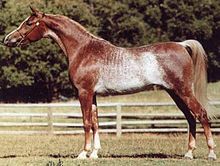Rabicano
[2] Rabicano is distinct from true roan, which causes evenly interspersed white hairs throughout the body, except for solid-colored head and legs.
[3] The word appears very early in epic poems in Italian literature: In Orlando Innamorato (1495), "Rabicano" is a magic horse originally ridden by Argalia.
The characteristics most often associated with the rabicano pattern are white hairs at the tailhead and the flank, where the body of the horse is joined by the hindquarters.
Minimal expression may include a few white hairs in those areas, but is often not mentioned in descriptions of an individual horse's color.
However, in highly expressed rabicanos, the distribution of white hairs along the barrel may produce faint striping or stippling over the ribs, which is not seen in true roans.
[4] While rabicano itself does not produce white markings on the face and legs, it can be confused with some of the numerous sabino patterns, one of which has been mapped to the KIT gene.





